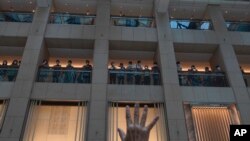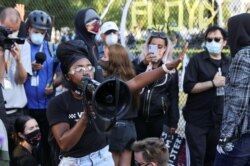Chinese officials – further escalating diplomatic tensions with the United States – are criticizing the U.S. government’s response to anti-racism protests across the country that have descended into violence.
Chinese officials have compared the U.S. unrest to the pro-democracy demonstrations in Hong Kong and called racial discrimination in the U.S. a "persistent social ill.”
In Hong Kong, where Beijing is in the process of eliminating political and speech freedoms though new national security initiatives that U.S officials have denounced, top official Carrie Lam told reporters Tuesday that the American protests are an example of a “double standard.”
Lam said U.S. officials, “are very concerned about their own national security, but on our national security … they are looking at it through tinted glasses.”
Lam appeared to be referring to U.S. criticism of the violent response by Hong Kong security forces to political demonstrations in recent months.
China exercises tight control over its citizens. Peaceful assembly to protest the government is not allowed; government censors scrub China’s internet, which is set off from the rest of the world by “the Great Firewall” for objectionable speech; religious groups are subject to government monitoring; and there are no independent courts. That has made the country one of the least free in the world, according to Freedom House, which uses social science to assess a country’s level of freedom.
Beijing has long portrayed racism as a Western problem even while pursuing policies that discriminate against ethnic and religious minorities at home.
Last month, many Africans living in the southern Chinese city of Guangzhou complained that they were subject to forced coronavirus testing and arbitrary 14-day self-quarantine, regardless of their recent travel history. Some of them said they were left homeless after being evicted by landlords and rejected by hotels.
But the death of George Floyd, a 46-year-old African American man in custody of a white policeman last week in Minneapolis, has led Chinese officials to champion the rights of America’s ethnic minorities.
“The racial discrimination against minorities is a social ill in the United States,” said Zhao Lijian, a spokesperson for the Foreign Ministry, on Monday. “What happened again reflects there are serious problems that should be urgently addressed."
The day before in a tweet directed at her American counterpart – Morgan Ortagus, who had previously criticized Beijing's crackdown on Hong Kong protests – Chinese foreign ministry spokesperson Hua Chunying posted on Sunday "I can't breathe."
Her message is a reference to some of the final words uttered by George Floyd as a white officer pressed his knee into Floyd’s neck for eight minutes as he was face-down on the ground in handcuffs.
“I can’t breathe” also echoes the last words of New Yorker Eric Gardner, 43, who died in 2014 after he argued with officers trying to arrest him on suspicion of selling loose cigarettes. Garner’s last words, “I can’t breathe,” became a rallying cry in early in the Black Lives Matter movement, formed to end the disproportionate use of deadly force against nonwhite people by U.S. police departments.
Footage of the current unrest in America has been widely disseminated in Chinese state media, which have long argued that the United States’ partisan politics make for chaotic governance.
In a series of tweets, Hu Xijin, the editor of the state-run Global Times, was trying to ridicule U.S. officials and House Speaker Nancy Pelosi, who on June 19, 2019, described the Hong Kong protests as a "beautiful sight to behold" 10 days after an estimated half million people marched in Hong Kong.
"Now they can witness it by their home windows," he wrote. "I want to ask Speaker Pelosi and Secretary Pompeo: Should Beijing support protests in the US, like you glorified rioters in Hong Kong?"
For some analysts, China's response to the protests sounds familiar to Beijing’s rhetoric on the coronavirus situation in the U.S.
"As the relations are deteriorating between the two countries, China regards this as something they can take advantage of, something they can gloat [about]" said Ji Shuoming, a Chinese commentator now based in Hong Kong.
National security adviser Robert O’Brien on Sunday said China is just one of Washington’s foreign foes trying to exploit tense race relations in the U.S. He told ABC’s This Week that he saw "a number of tweets from the Chinese today that are taking some sort of pleasure.”
“There's a difference between us and you,” said O’Brien, speaking of foreign adversaries. “When this happens, we'll get to the bottom of it and we'll clean it up.”






